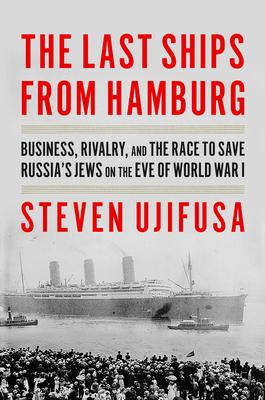"A captivating group portrait of three 'titans' of industry who facilitated the steamship routes by which around 2 million Jewish refugees, fleeing pogroms and discrimination, immigrated from Europe to America between 1890 and 1921. . . . Ujifusa ties this intricate business history into a broader economic and diplomatic context and relates the experiences of regular people who made the crossings, including the families who perished aboard the Titanic. This innovative account provides a complex new perspective on the turn of the 20th century."--Publishers Weekly (starred review)
"Absorbing . . . a David-and-Goliath tale of the industrial age."--Wall Street Journal
A propulsive human drama that chronicles the mass exodus of Jews from Eastern Europe to America in the early years of the twentieth century, and the men who made it possible.
Over thirty years, from 1890 to 1921, 2.5 million Jews, fleeing discrimination and violence in their homelands of Eastern Europe, arrived in the United States. Many sailed on steamships from Hamburg.
This mass exodus was facilitated by three businessmen whose involvement in the Jewish-American narrative has been largely forgotten: Jacob Schiff, the managing partner of the investment bank Kuhn, Loeb & Company, who used his immense wealth to help Jews to leave Europe; Albert Ballin, managing director of the Hamburg-American Line, who created a transportation network of trains and steamships to carry them across continents and an ocean; and J. P. Morgan, mastermind of the International Mercantile Marine (I.M.M.) trust, who tried to monopolize the lucrative steamship business. Though their goals were often contradictory, together they made possible a migration that spared millions from persecution. Descendants of these immigrants included Ruth Bader Ginsburg, Este Lauder, George Gershwin, Irving Berlin, Fanny Brice, Lauren Bacall, the Marx Brothers, David Sarnoff, Al Jolson, Sam Goldwyn, Ben Shahn, Hank Greenberg, Moses Annenberg, and many more--including Ujifusa's great grandparents. That is their legacy.
Moving from the shtetls of Russia and the ports of Hamburg to the mansions of New York's Upper East Side and the picket lines outside of the notorious Triangle Shirtwaist Factory, The Last Ships from Hamburg is a history that unfolds on both an intimate and epic scale. Meticulously researched, masterfully told, Ujifusa's story offers original insight into the American experience, connecting banking, shipping, politics, immigration, nativism, and war--and delivers crucial insight into the burgeoning refugee crisis of our own time.
